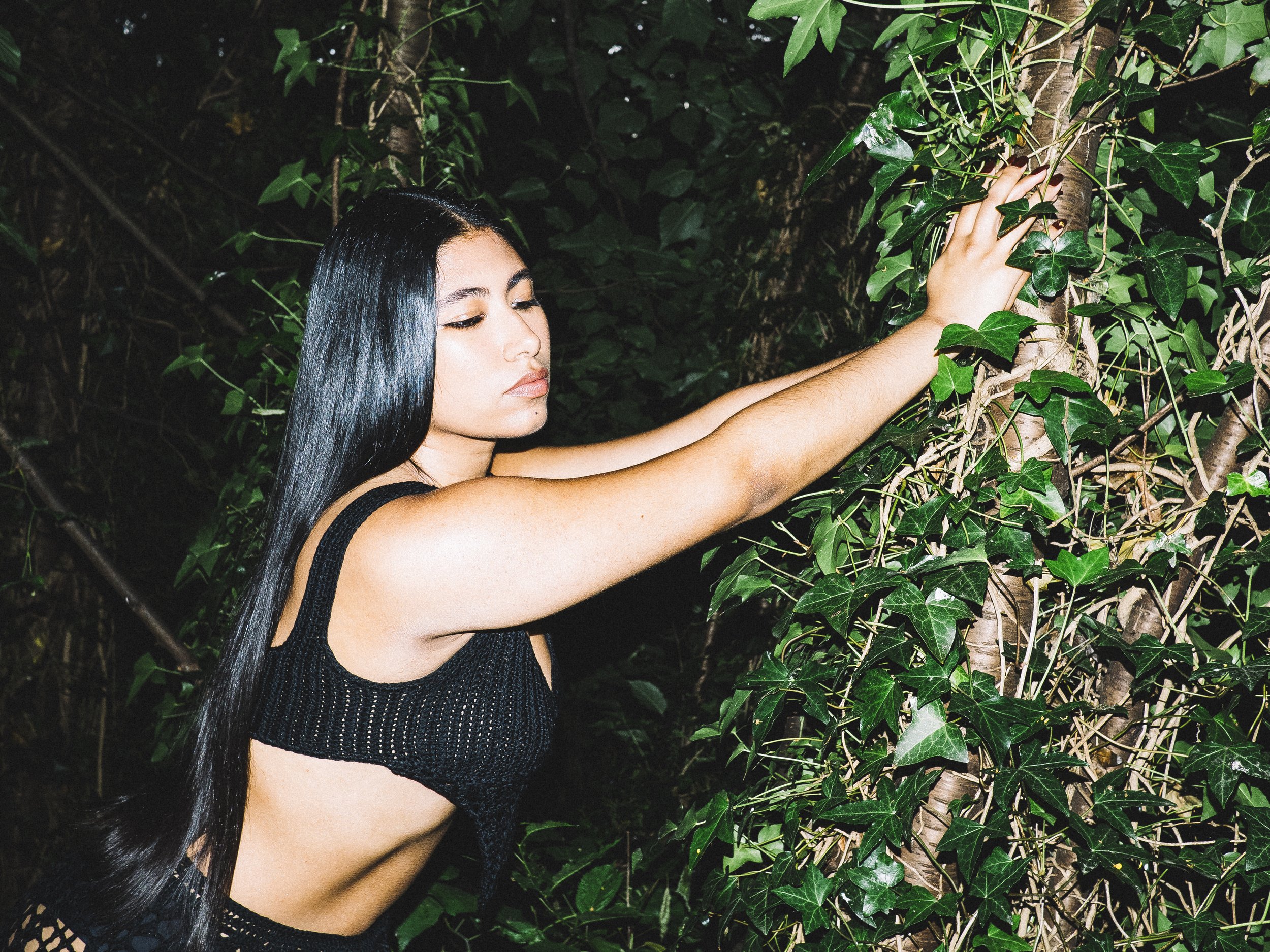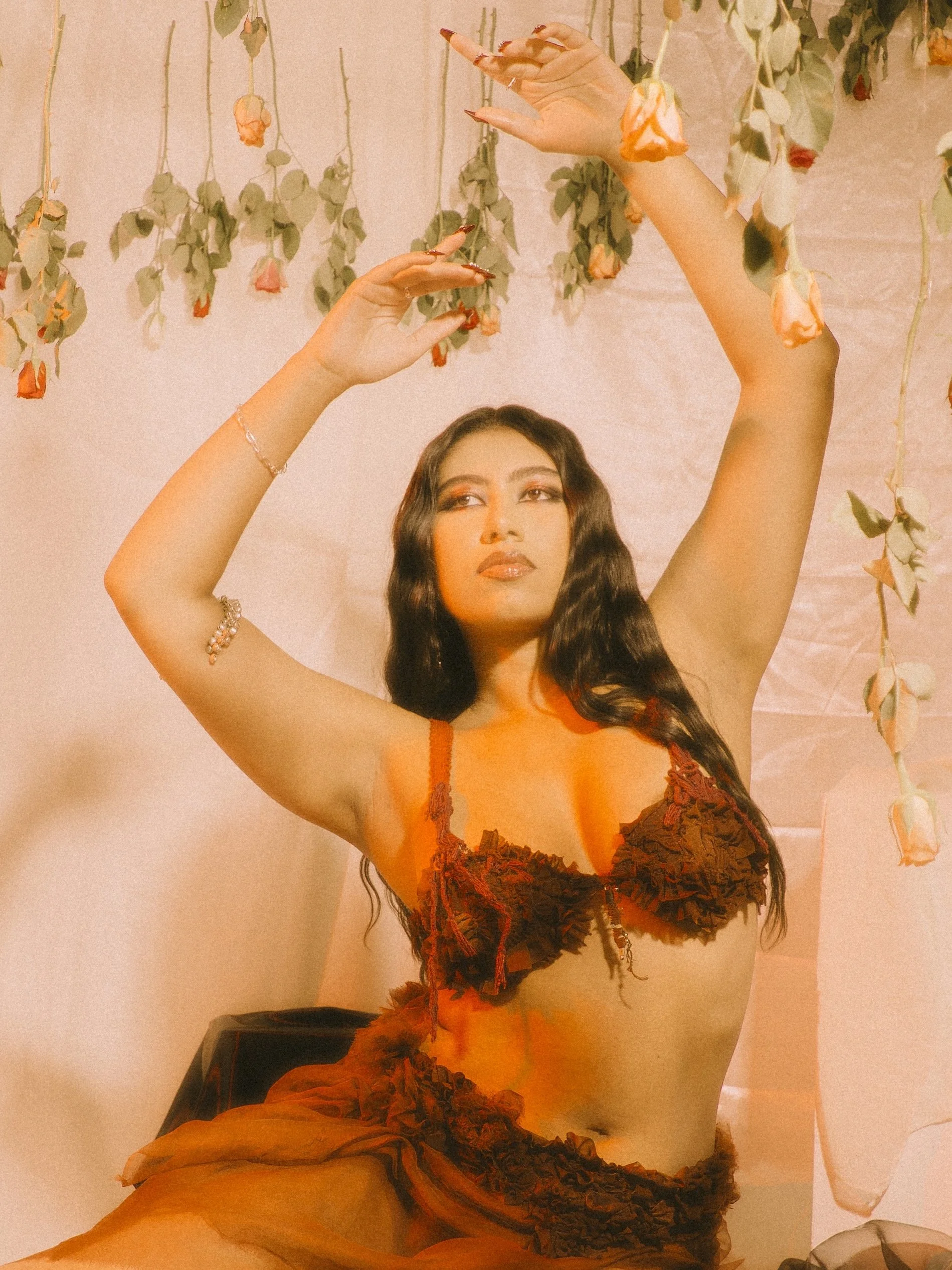Sophie Castillo and British Latinidad
“Do you all like salsa? Well, you will love our next act,” a pumped-up MC exclaims. Then, a performer takes center stage and suddenly a new aura falls upon the dimly lit venue. This young woman starts singing and in doing so, showcases mesmerizing melodies and stellar vocals combined with fresh lyrics. Only one song into her set, she enthralls the audience. Wearing a denim outfit with long boots, she further elicits a powerful stage presence. She then introduces a bilingual song that feels like something one would hear as a child at their abuelita’s house. Yet, the vibe is reminiscent of an indie concert. Latin, indie, refreshing. These words come to mind as the fusion of music continues. This performance was not in New York or even in the United States but rather at a venue in London, where people showed up to watch Sophie Castillo.
Across the Atlantic Ocean in the United Kingdom—despite the relatively small Latin American diaspora—Latinx artists are attempting to make visible the realities of being Latinx in a country that is far too unfamiliar with the diaspora and its people. A great example, and perhaps the epitome of this, is the Cuban-Colombian-British musician Castillo. Born, raised, and still based in London, Castillo employs a wide array of genres based on various forms of Latin American music paired with bilingual lyrics and tender topics. In doing so, Castillo provides insight into what Latinidad means and looks like in the British context.
Castillo’s music most accurately fits into the indie music category due to her writing and producing music on her own, independent of commercial record labels. But with her alternative method of fusing Latin American music styles such as reggaetón with elements of pop music, it’s not easy to place her within a box. According to Castillo’s website, by “pairing her soft flowing vocals with catchy melodies and sensual rhythm, she echoes the romanticism of the Latin music she grew up with to create a cinematic, dreamy and glamorous sound.” Not bound by one national musical tradition, Castillo combines genres that extend beyond Cuba, Colombia, and the United Kingdom.
“Solo Tú” opens with a soft guitar and tropical bossa nova instrumentals. “Sígueme, yo te espero hasta el final de este mundo/Yo te llevaré a un lugar donde estaremos juntos” (Follow me, I will wait for you until the end of this world/I will take you to a place where we will be together). That's exactly what she does. Castillo transports you into her reggae- and bossa nova-inspired love song. She paints an idyllic world where she can exist with just her and her lover, free to live and love together.
In perhaps her most popular song, “Call Me By Your Name,” Castillo incorporates the music genre of bachata, which originated in the Dominican Republic. While in the background, the punchy bachata sounds complement the other soft elements of this pop-forward song. Moreover, the lyrics tell the story of what it’s like to be so smitten with someone that you desire to be their lover. The combination of romantic lyrics and soft melodies gives an overall tenderness to the piece.
Although Castillo may live in the often cloudy UK, the opening guitar of “Call Me By Your Name” immediately transports you to the Caribbean. The guitar gives way to an irresistible bachata rhythm over which Castillo puts you under a spell with her lush vocals. She calls you in like a siren, straddling the line between dreamy and intense. Her vocals portray a sense of wanting, lust, and passion, bringing in elements typically found in R&B songs. When she croons the title in the chorus, you can hear the yearning in her voice on the dragged-out “name.” It makes me think of the specific feeling of kissing in the rain.
It is through this feeling that she touches upon themes of love and identity that result from wanting a lover to complete her identity—something listeners of any cultural background may have experienced. She admits she doesn’t fully understand the intricacies of what she’s feeling, but she invites the listener to feel with her and give into the song. “No sé qué me pasa/Solo sé lo que siento,” she sings as she draws you into her fantasy. Castillo depicts a love that is all-consuming and infatuating. “Call Me By Your Name” is a serenade to her lover—Castillo is losing control and she beckons you to lose control with her.
Lyrically, Castillo seamlessly alternates between Spanish and English, bringing together the two languages that form part of her identity. “Call Me By Your Name” begins in Spanish with “Yo no sé que pasó, pero tú me robaste el corazón/No sé que sucedió, pero tú me amaste sin condición (I don’t what happened, but you stole my heart/I don’t know what occurred, but you loved me unconditionally).” Starting a bilingual song in Spanish is not rare, at least not in the United States—take “Fresh Air” by Melii, “quiero sentirme bien” by Kali Uchis, and “For Ya” by Paloma Mami as examples—but it is more distinctive in the context of the UK.
Then the song transitions to mostly, but not exclusively, English lyrics while blending with bachata. This form of code-switching highlights what typically defines many in the Latinx community: Effortlessly switching between two languages is a reflection of the spaces they inhabit and have carved out for themselves. While Latin Americans do not use this technique as often, it is similar to how U.S. Latinx approach their music. Omar Apollo, who is gaining more recognition in the UK, is just one example.
In an interview with Raydar, Castillo delves into her music style, explaining, “‘Love Me That Way’ is a very daytime, airy song, and ‘When The Sun Goes Down,’ I see it as a more sundown, sexy kind of vibe. With ‘In My Mind,’ I see it as a nighttime disco song and who knows, maybe my next song will be something at 3 a.m. Releasing those three songs and discovering the kind of songs I want to make has been very important and valuable.”
Though her songs vary in genre, they all seem to share a crucial commonality: strong admiration and the feeling of longing that encompasses it. On themes present in her music, Castillo tells Raydar, “I’m definitely a quite romantic person, and I like to show that in my music as well. Just saying the things that you can’t really say out loud, but they’re in your heart. I’m a big fan of positive affirmations and also, I had a time in my life where I had a lot of anxiety and the only way that I was able to get out of that was mindfulness and changing the way I think.”
Recently, Castillo received a nomination from the Latin American Awards by LA United for Best Latin American Artist in the UK; this year is the third time the award ceremony has taken place. The award committee explains that “the night of the Latin American Awards '24 will be a testimony to the outstanding achievements and contributions of outstanding Latin Americans as entrepreneurs and migrants and you can be part of it.” Interestingly, the awards use the term “Latin American” as a catch-all, regardless of whether they are explicitly from Latin America or the diaspora. A similar kind of award show in the United States might be more likely to use a word like “Latino” to group the many people who make up Latinx communities.
As with many young indie artists who hope to break into the music industry, Castillo has built a sizable social media presence, with 44,000 followers on Instagram alone. She uses her platform to connect with fans and to invite her followers into her music-making process.
An interesting feature of Castillo’s Instagram presence is her occasional mentions of Kali Uchis, a fellow Latina of Colombian descent. In one post about her music, she writes, “POV: you’re listening to Kali Uchis and Lana Del Rey’s Latin lovechild.” With that, Castillo makes clear that Kali Uchis is an inspiration with whom she hopes to be in conversation.
By positioning herself parallel to Kali Uchis, Castillo, who uses Colombian cumbia as a way of honoring part of her identity, is playing into her colombianidad. The use of Colombian music is also reminiscent of Shakira whose “…multiple subject positions… contribute to a sense of latinidad and colombianidad both within and outside of U.S. borders.” But because of their backgrounds, it’s likely their career trajectories will pan out differently. Colombia-born Shakira transitioned from rock en español to pop in English to appeal to a wider audience, particularly in the United States. Castillo grew up in the UK, fluent in English. She could have easily chosen to make music solely in English and followed in the footsteps of the UK’s biggest pop stars. However, she decided to connect to a more international Latinx audience with her music. It’s a very deliberate decision because, unlike parts of the United States, where Latinx communities are ever-present and impactful, the UK’s Latinx population does not have the same visibility. On the Census 2021, 76,000 — or 0.1% — people in Wales and England identified as Hispanic or Latin American. (The actual number is likely higher as this was a write-in response.)
Essentially, Castillo grew up in a place where she couldn’t surround herself with others of similar backgrounds. “As I got older and learned more about my heritage, I became more appreciative,” she tells Raydar. “I started wanting to incorporate that in my music by using more Spanish and diving into more genres…you grow up in such a British environment and don’t know a lot of Latinas. You don’t really express that side of yourself because you’re so worried about fitting in like all teenagers are. As you get older, you start thinking more about your identity and where you come from.”
Things are changing, though, and the next generation of British Latinx will hopefully see themselves represented in the media more often. British media is increasingly paying more attention to Latin music and Latinx creators in the United Kingdom. The Observer New Review named Andrés N. Ordorica, a queer Latinx writer based in Edinburgh who writes on diaspora and belonging, as one of 2024’s best debut novelists. Additionally, musicians like Desta French and Patrick Vel—who, like Castillo, create songs on their notions of identity—are also receiving shout-outs from media outlets.
For Castillo, Latinx artists in the UK are carving their own path. “UK Latinx artists are definitely bringing a new perspective on Latin music to the table,” she tells Intervenxions. “We’re incorporating sounds from our heritage with sounds we heard growing up in the UK. I think the alternative UK Latin artists especially are getting super creative with their sounds, and it’s so exciting to hear! We want to create something new whilst also being inspired by our roots and the beautiful music that was created in Latinoamérica. I think the fusion is so beautiful and symbolic of what it’s like to grow up in another country when your heritage is from somewhere else.”
Sophie Castillo proves to be a pivotal figure, especially as a young independent Latina musician. By genre-bending—with her music spanning pop, alternative, indie, and Latin—Castillo mediates between the traditions of Latin American music and other recognizable music genres. For instance, R&B, originating within Black American communities, and bossa nova, a relaxed style of samba developed in Rio de Janeiro, Brazil.
Castillo formulates a Latinx identity that is distinctly her own yet tangible for the British audience. She does this by infusing universal themes of love and affect that are so intrinsic to her persona and music at large. Still, she grounds herself in spheres of Latin American and American Latinx cultural production while combining this with her own refreshing style of music. Emphasizing tender lyrics and melodies that take us to a new emotional level, Castillo offers us a glimpse into what it means to be British and Latinx, and how these identities shape the UK’s notion of Latinidad.
Iván Brea is a Dominican-Nicaraguan-American writer born in New York City and primarily raised in the Texas city of El Paso, situated on the Mexico-United States border. He is currently a master's student in Latin American Studies at the University of Cambridge in the United Kingdom and a recent graduate of New York University (NYU) where he earned a Bachelor of Arts with High Honors in Politics & Spanish and Portuguese, cum laude. His research focuses on representations of religion and spirituality in Mexican and Greater Mexican literature and film.




